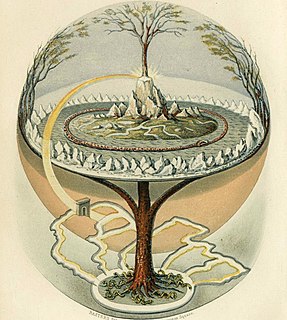
A demon is a supernatural entity, typically associated with evil, prevalent historically in religion, occultism, literature, fiction, mythology, and folklore; as well as in media such as comics, video games, movies, anime, and television series.

The tree of life is a fundamental archetype in many of the world's mythologies, religious, and philosophical traditions. It is closely related to the concept of the sacred tree.
In the Vedic tradition, soma is a ritual drink of importance among the early Vedic Indo-Aryans. The Rigveda mentions it, particularly in the Soma Mandala. Gita mentions the drink in Chapter 9. It is equivalent to the Iranian haoma.
Haoma is a divine plant in Zoroastrianism and in later Persian culture and mythology. Haoma has its origins in Indo-Iranian religion and is the cognate of Vedic soma.

Angra Mainyu is the Avestan-language name of Zoroastrianism's hypostasis of the "destructive/evil spirit" and the main adversary in Zoroastrianism either of the Spenta Mainyu, the "holy/creative spirits/mentality", or directly of Ahura Mazda, the highest deity of Zoroastrianism. The Middle Persian equivalent is Ahriman 𐭠𐭧𐭫𐭬𐭭𐭩. The name can appear in English-language works as Ahrimanes.

Ahura is an Avestan language designation for a particular class of Zoroastrian divinities. The term is assumed to be linguistically related to the Asuras of Indian Vedic era.

A daeva is a Zoroastrian supernatural entity with disagreeable characteristics. In the Gathas, the oldest texts of the Zoroastrian canon, the daevas are "gods that are rejected". This meaning is – subject to interpretation – perhaps also evident in the Old Persian "daiva inscription" of the 5th century BCE. In the Younger Avesta, the daevas are divinities that promote chaos and disorder. In later tradition and folklore, the dēws are personifications of every imaginable evil. Over time, the Daeva myth as Div became integrated to Islam.

Homosexuality in Zoroastrianism is, as in many other religions, a controversial topic with differing consensus over time.

Sraosha is the Avestan name of the Zoroastrian yazata of "Conscience" and "Observance", which is also the literal meaning of his name.
Harā Bərəzaitī, is the name given in the Avestan language to a legendary mountain around which the stars and planets revolve.

Dahman or Dahman Afrin is the Avestan language name of a Zoroastrian concept, later considered to be the embodiment of prayer, and ultimately (also) as a divinity, one of the yazatas.

The Ab-Zohr is the culminating rite of the greater Yasna service, the principal Zoroastrian act of worship that accompanies the recitation of the Yasna liturgy.
There has been much speculation as to the botanical identity of soma or haoma. Soma is a plant described in Hindu sacred texts including the Rigveda, while haoma is a plant described in the Avesta, a collection of Zoroastrian writings. Both names are derived from the Proto-Indo-Iranian *Sauma. Proposed candidates include various species of plants, fungi, and proposed mixtures of these candidates with each other and with other substances. Traditional Indian Soma is Somalata used traditionally by the Srauta Brahmins called Somayajis whereas the Avestan Haoma is an Ephedra, which are totally unconnected species sourced from different areas. European researchers suggest other plants, such as the perennial Peganum harmala, Nelumbo nucifera, Cannabis sativa, and the sugarcane species Tripidium bengalense ; while fungal candidates include the fly-agaric mushroom Amanita muscaria, the psilocybin-containing mushroom Psilocybe cubensis, and the ergot fungus Claviceps purpurea.

The Vendidad /ˈvendi'dæd/ or Videvdat is a collection of texts within the greater compendium of the Avesta. However, unlike the other texts of the Avesta, the Vendidad is an ecclesiastical code, not a liturgical manual.

Amerdad is the Avestan language name of the Zoroastrian divinity/divine concept of immortality. Amerdad is the Amesha Spenta of long life on earth and perpetuality in the hereafter.

Frashokereti is the Avestan language term for the Zoroastrian doctrine of a final renovation of the universe, when evil will be destroyed, and everything else will be then in perfect unity with God.

Prince of Persia: The Forgotten Sands is an action-adventure video game developed by Ubisoft Quebec for the Wii. It is the eighth installment to the Prince of Persia franchise and takes place in the seven-year gap between Prince of Persia: The Sands of Time and Prince of Persia: Warrior Within. The game was released in North America on May 18, 2010 and Europe on May 20, 2010.
Marcos Hugo Zarich is an Argentine former football midfielder. He played most of his club career for River Plate and Boca Juniors and played for Argentina at the 1960 Summer Olympics.

Saman Samadi is a Persian-American composer, performer, and current doctoral researcher at the University of Cambridge.
Melati Daeva Oktavianti is an Indonesian badminton player. She is a doubles specialist. She was the 2012 World Junior mixed doubles champion partnered with Edi Subaktiar.






